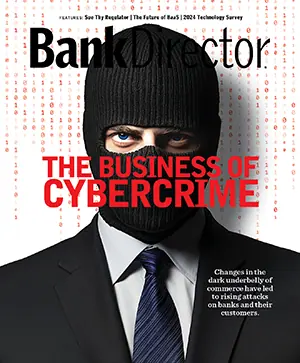
Building Brand. Gotta Be Big?
If you’re not Coke, you sure better be Pepsi. If you’re not AT&T, and if you’re not MCI or Sprint, then aren’t you an also-ran?
And what if you’re not NationsBank or Chase or Bank One, what’s your future as a brand? What if you’re a director of one of the 9000 or so banks out there that are wondering if there’s a place for them in the 21st century?
At the recent Retail Delivery ’98 Conference in Las Vegas, there was a lot of talk about brands and branding. It’s becoming conventional wisdom that (a) building a brand is critical to survival, and (b) only the largest banks have the market clout to build a brand. As Bank One CEO John B. McCoy said, “If you’re not a player, it will be hard to get to be a player.”
Maybe, maybe not. Branding does present problems for small and medium-sized banks. It’s a fact of life that it’s expensive to establish a brand. Still, you needn’t be a megabank to compete. Here’s an inexhaustive list of how you can still “get to be a player”:
Establish a specialty. Silicon Valley Bank out-competes Bank of America and everybody else for high-tech company clients. They know the business better, they stay closer to their customers, and they get and keep the most desirable technology companies in Northern California and beyond.
Dominate your market. Even in markets where the biggest banks rule, there are pockets where a local bank competes or even dominates. Usually, such a bank has chosen to dig deeper into limited geographic territory and to serve that market with more branches, more ATMs, more loan officers on the streetu00e2u20ac”more attention. These banks are inevitably the most profitable and the most attractive acquisition candidates, as well.
Be unbankly. Look how the small consumer products companies gain notice. Their advertising entertains; their promotion is unconventional, often quirky. If you’re not going to get noticed because of the volume of your advertising, you’ve got to get attention in ways your competitors, ever more self-important as they grow, won’t risk trying.
Be maniacal about quality. A reputation for uncommon levels of customer satisfaction can still build brand loyalty, even for little guys. Dell’s done it in computers, BMW’s come from back in the car pack, and Restoration Hardware has become the fastest growing furniture chain in anyone’s memory. Indifferent attention to customers by major banks has created an opportunity for the aggressive bank in most any market to establish its brand by offering clearly superior service and products.
If you had to be big to build brand, there’d be Pizza Hut but no Domino’s, IBM but no Compaq, Barnes & Noble but no Amazon. A bank that gives up in the fight to build brand may be outflanked not by a larger competitor, but by an upstart who isn’t intimidated by the “big is better” flavor of the day.
And if you have any doubt that what’s happening around us isn’t any fun, listen to Tom Wolfe’s spin on banking in his current bestseller, A Man In Full…
“For seventy-five years the bank had been called the Southern Planters Bank and Trust Company. But now that seemed too stodgy, too slow-footed, too old-fashioned and, above all, too Old South. Planters was a word humid with connotations of cotton plantations and slavery. So Planters had been sterilized and pasteurized into Planners. Nobody could object to Planners; even the most dysfunctional welfare case in the Capital Homes could be a Planner. Then the two words, Planners and Banc, were fused into PlannersBanc in keeping with the new lean, mean fashion of jamming names together with a capital letter sticking up in the middle…NationsBank, SunTrust, BellSouth, GranCare, CryoLife, CytRtx, XcelleNet, 3Com, MicroHelp, HomeBanc…as if that way you were creating some hyperhard alloy for the 21st century.”

Join OUr Community
Bank Director’s annual Bank Services Membership Program combines Bank Director’s extensive online library of director training materials, conferences, our quarterly publication, and access to FinXTech Connect.
Become a Member
Our commitment to those leaders who believe a strong board makes a strong bank never wavers.

